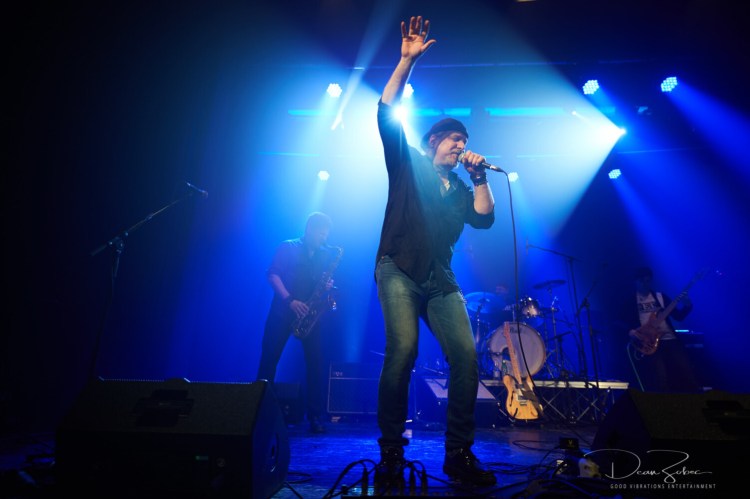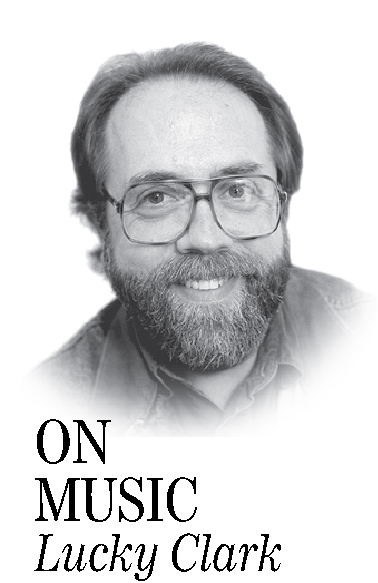This week, I want to introduce to you a gentleman whose been around since 1987 when he began his musical journey as lead guitarist for Pittsburgh’s legendary band Joe Grushecky and The Houserockers. Bill Toms left that group to become a solo artist and has released a number of albums with his band Hard Rain, the latest of which — “Keep Movin’ On” — will come out April 30 on Terraplane Records, though the first official single, “Everybody’s Talking,” will be dropped March 15. Having heard a prerelease copy of said CD, I knew I had to chat with Toms about his history, his music and how he’s made it through the pandemic so far. I called him at home in Pittsburgh on the 23rd of February.
Q: Now, for full disclosure, this is the first album of yours that I’ve heard, and I wish I had discovered you many albums ago.
Toms: Yeah, it’s just one of those things where the record industry is kind of rough, ya know? So we’re trying to do what we can.
Q: Is “Keep Movin’ On” pretty indicative of what your early work is like?
Toms: Well, I would say that I’ve gone through some different phases, for the most part. The early stuff is more rock ‘n’ roll/folk based whereas, in the last 10 years, I started using horns to a certain degree, trying to experiment with using horns in a different way than say like Tower of Power, using them to fit into a rhythm and blues/soul type of an idea that I have. With this record it’s a little bit more of a throwback to the rock ‘n’ roll sound we had before (but) with horns.
Q: Well, one thing that I enjoy about what is on this CD, other than the compelling nature of your vocals, is that rhythmically and stylistically it’s a musical journey. From one song to another, you don’t know what’s coming next. I love that quality in an album; I love taking that journey.
Toms: Yeah, well thank you. When we started the “Memphis” record in 2011, I wanted to explore the American sound, and more so the American rhythms and the grooves. Back then I was experimenting with those rhythms and grooves, and using “Memphis” as sort of like the middle of American roots music: soul music, rock ‘n’ roll, and rhythm and blues. Since then it’s always been in the back of my head to use different rhythms.
Q: That certainly keeps the interest level up, at least for me.
Toms: Well, for me too, (chuckle) … and you don’t want to keep rehashing the same thing over and over again. I try to use the music itself, the grooves and the rhythms, as a way to express what I’m trying to say lyrically. Probably way back when I started making records on my own, outside of The Houserockers, I played with Joe Grushecky and The Houserockers for 19 years. I probably used the folk music more so than anything, because I just needed something to say. I needed to have a voice, so I just started there.
Q: What happened then?
Toms: Well, when I actually quit The Houserockers in 2006, I put my acoustic guitar in my van and just took gigs all across the country to try and develop a solo act. (I would stand) in front of people for an hour-and-a-half or two hours to try to entertain but also to keep their interest with just the lyrics and my acoustic guitar. And from there it was just up to gathering the band, and then I started to utilize the things that were of interest to me.
Q: Like what, for example?
Toms: A horn section. I look at the horn section like Albert King and B.B. King used. … But with this record I kind of went more for the rock ‘n’ roll stuff, … utilizing it on “Still Got Love,” … and the other one would be “Walk In My Shoes.”
Q: Even though I probably know the answer to my next question …
Toms: (Chuckle)
Q: Yeah, I know, “How has the pandemic affected you?”
Toms: (Laughter) Yeah, well we had started playing, pre-pandemic, not knowing that we wouldn’t be actually doing this for a year. We had started this record about the same time, and last February we started recording. I think we did one session and realized that this was going to be different. I had a lot of the songs written, and I was still writing. I was in a good place as far as writing songs was concerned, so we needed to actually put this together somehow without all being in the same room together.
Q: How did that go?
Toms: Well, that’s something that I was never used to doing. We’ve always got in a room together and hash it out — record the rhythm section all together. But Ricky Witkowski was producing. Shat I would do is start a song at my home studio and send him the tracks, send him a loop, and he would create the drums and bass just to flesh things out. We would build a song that way. It was a fresh way for me to do things, because I could actually sit at home and work on arrangements more so than I had before. So it’s a little different in that respect, but I’m very pleased with the outcome. Rick Witkowski is a fantastic producer.
Q: And there’s a cohesion here, too, that belies the fact that this took place all over the place, if you know what I mean.
Toms: Right and I hope that it is within the lyrical content, as well.
Q: Yes, for sure.
Toms: Well, to me, that’s a big part of what I do, and to find my voice and to have something to say, especially within a pandemic. The whole idea of this record, when I realized what I was writing about as I started going through it, is … moving forward. I’d like to move forward in a positive direction, but sometimes it’s sideways, you know? You’re moving physically and emotionally and artistically, and all the songs tie in that way, I think.
Q: Another thing that impresses me about what you do is the honesty one hears on this album. There’s no sugar-coating, and your vocal stylings are the perfect vehicle for the songs, which makes sense because you wrote them, after all.
Toms: Right, and thank you. Yeah, it’s hard for me to make up things. I learned a long time ago that the best songs I write are the ones that I know a whole lot about — the things that I read about; the things that I live and understand. So, yeah, honesty is a big part of it. In music, or any of the arts as you would know, it is believability.
Q: Is there anything, Bill, that you’d like me to pass on to the folks reading this article?
Toms: Just the fact that the album, I think, is worth hearing (chuckle), and I think it’s relevant for these times. billtoms.com
Lucky Clark has spent over 50 years writing about good music and the people who make it. He can be reached at luckyc@myfairpoint.net if you have any questions, comments or suggestions.
Comments are not available on this story.
Send questions/comments to the editors.



